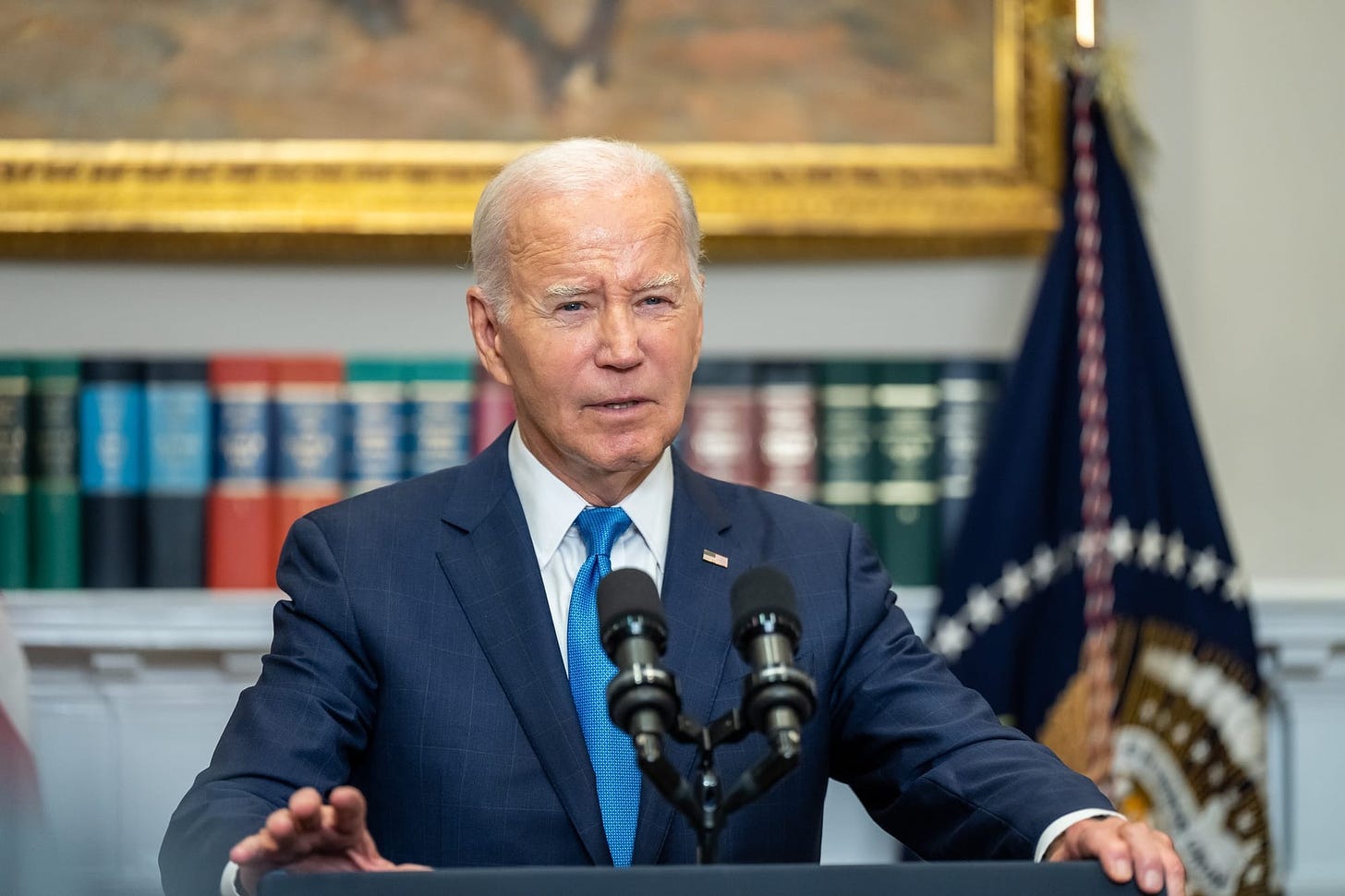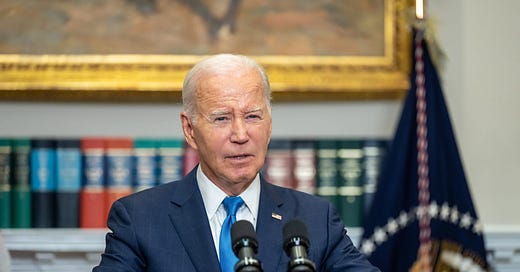Should Biden drop out?
Should President Biden drop out of the presidential race? Viewpoints from multiple sides.

Happy Friday! If you have 5 extra minutes, please help us improve by completing our inaugural survey. (Thank you if you already have.)
New to Framechange? Sign up for free to see multiple sides in your inbox.
Learn more about our mission to reduce polarization and how we represent different viewpoints here.
What’s happening
Calls have mounted over the past two weeks for President Joe Biden to drop out of the presidential race after his performance against Donald Trump in the Jun 27 debate. Many observers labeled Biden’s debate performance as poor and a reflection of his declining mental acuity, with Biden himself admitting it was a “bad night.”
What happened: During the debate, President Biden seemed at moments to lose his train of thought and fail to clearly articulate arguments, behavior observers tied to existing concerns about his age. Since the debate, Biden through several public appearances – including a Jul 5 ABC interview and Jul 8 appearance on MSNBC’s Morning Joe – has attempted to quell those concerns to mixed reviews.
Reactions: Biden has remained adamant that he will stay in the race, most recently defending his candidacy at the NATO summit on Jul 11. While Democratic party leaders largely support Biden in public, there is a growing list of Democrats that have called for him to step down, including 17 Representatives and 1 Senator. Public supporters of Biden’s candidacy include 60 members of Congress, the Congressional Black Caucus, and the Congressional Hispanic Caucus.
What could happen next: If Biden were to drop out prior to the Democratic National Convention on Aug 19-22, the Democratic party could hold an open convention to select his replacement. Candidates that have been viewed as potential replacements include Vice President Kamala Harris, California Governor Gavin Newsom, and Michigan Governor Gretchen Whitmer.
At an open convention, delegates chosen at the state and county level vote on candidates until one of them secures the 1,968 votes required to win the nomination. It would be the first open convention since 1968. Biden could endorse Vice President Kamala Harris, and if the party followed suit, his delegates would effectively be transferred to her, giving her the nomination.
Only 3 incumbent presidential candidates have ever withdrawn in the middle of their campaign and a potential Biden withdrawal would be the closest in history to the election.
Support for or opposition to Biden dropping out is fairly mixed across party lines, and partially dependent on whether his dropping out might benefit or hurt a party’s chances at the presidency. This week we bring you the viewpoints from multiple sides. Let us know what you think.
Notable viewpoints
Supportive of Biden dropping out:
Biden is currently unfit to serve as president.
Biden’s debate performance and recent public appearances have shown he is unfit for a second term; he should voluntarily relinquish his candidacy to someone more capable of campaigning and of running the executive branch of government.
Biden’s slip-ups and disconnect from the realities of his candidacy have continued beyond the debate, including in his Jul 7 ABC interview, where he misspoke several times and seemed to make the outcome of the election more about him than about the future of American democracy.
Biden has demonstrated he is mentally unfit to serve as president and he should be removed from office before the election via the 25th Amendment.
With the world in a heightened state of tension, Biden’s declining mental acuity casts significant doubt on his ability to make critical decisions and keep the country safe.
Biden dropping out puts the Democratic party in the best position to win the presidency.
Biden’s poor debate performance and apparent lack of fitness for a second term have distracted from the flaws in Trump’s candidacy; replacing Biden may be the Democrats’ only way to refocus on Trump’s weaknesses and defeat him.
Replacing Biden on the ticket would give Democrats a fresh platform to campaign on with clear, thoughtful policy ideas such as expanded Medicaid, higher minimum wage, universal pre-K, and an updated approach to the war in Gaza that could rally enough of a voter base to defeat Trump.
“The clearest path for Democrats to defeat a candidate defined by his lies is to deal truthfully with the American public: acknowledge that Mr. Biden can’t continue his race, and create a process to select someone more capable to stand in his place to defeat Mr. Trump in November.” (New York Times Editorial Board.)
Vice President Kamala Harris, who is more capable at debating, has enough distance from Biden’s foreign policy decisions, and can speak on the critical abortion issue, would be a stronger candidate to defeat Trump.
Keeping Biden in the race may discourage otherwise-Democratic voters from voting at all in November, which could threaten Democratic seats in the House of Representatives and Senate.
The American public wants Biden to step aside.
A CBS News poll after the Jun 27 debate found that 72% of registered voters believe Biden lacks the “mental and cognitive health” to be president and 46% of Democratic voters believe he should not continue his campaign.
In a CNN poll after the debate, 56% of Democratic-leaning voters said the party would have a better chance with “someone else” while a recent New York Times-Siena poll found 74% of voters believe Biden is too old to serve.
Keeping Biden in the race would be hypocritical.
“The ongoing effort by Biden’s allies to shut down legitimate questions about the president’s clearly deteriorating faculties…is as shameless and irresponsible as just about anything Trump and his enablers have done…And if Biden refuses to step aside, it’d be an act of political selfishness surpassed in recent memory only by Trump’s efforts to remain in office after losing the 2020 election.” (The Dispatch Editors.)
Opposed to Biden dropping out:
Keeping Biden in the race puts the Democratic party in the best position to win the presidency.
History shows replacing a candidate during the race doesn’t work for the incumbent party; for example, sitting Democratic President Lyndon B. Johnson withdrew in 1968 from his second-term campaign in favor of Vice President Hubert Humphrey, a move that failed to shift criticisms away from a candidate already associated with Johnson’s policies and resulted in challenger Richard Nixon winning the presidency.
With Democrats lacking a clear and strong backup option to replace Biden, their best strategy is to continue through November with Biden because the chaos of the unknown is likely worse than sticking with him.
Democrats likely would not have enough time to develop a compelling campaign platform and strategy for any replacement candidate in the remaining 4 months before the November election.
The strength of the Democratic party’s governance over the past 4 years will mean more to voters in November than Biden’s campaign performance.
Based on historical election results, replacing Biden on the ticket would be a “huge mistake” for Democrats by giving up the historically significant advantages of incumbency and of a candidate that hasn’t had any significant challenge from within his own party.
Vice President Kamala Harris, who many view as the most promising candidate to potentially replace Biden on the ballot, would not necessarily be more electable; Harris currently polls similarly in approval ratings to Biden and hasn’t been a remarkable vice president.
Biden’s debate performance hasn’t significantly damaged his candidacy.
Since the debate, the RealClearPolitics polling average has Biden trailing Trump by 2.7 points (as of this writing) compared to 0.9 points before the debate, a larger gap but not by 15+ points or some other amount that indicates the bottom has fallen out.
One bad debate performance will not significantly impact Biden’s candidacy; before his landslide victory in 2012, President Obama lost a debate disaster, with 72% of viewers thinking he lost the debate (67% of viewers thought Biden lost the last debate).
Biden is the candidate most fit for the presidency in the race.
Biden is a far more favorable alternative to Donald Trump, whose character, agenda, and alleged association with Project 2025 may make him a threat to American democracy; Democratic voters should vote for him to lead the country for the next 4 years.
“Joe Biden and Kamala Harris defeated Donald Trump in 2020 and they are the Democratic ticket that will do so again this year. Any ‘leader' calling for President Biden to drop out needs to get their priorities straight and stop undermining this incredible actual leader who has delivered real results for our country.” (Rep. Frederica Wilson, D-Florida.)
Replacing Biden now would be undemocratic.
Replacing Biden on the Democratic ticket would amount to ignoring the democratic process, given he was the clear choice among Democratic primary voters. (Summarized from Jul 8 letter from President Biden to congressional Democrats.)
“It would be a massive affront to American democracy for them to have effectively given Democratic primary voters one choice for the entire primary process, and now that [Biden’s] had a disastrous debate performance, try to pull him. It's impossible.” (Rep. J.D. Vance, R-Ohio.)
Other viewpoints:
Biden dropping out would be worse for Republicans since he would be easier for Trump to defeat after the debate fallout than a replacement like Vice President Kamala Harris.
If the Democratic party replaces Biden now, it will force the party’s leaders to admit in some capacity that they have lied about the president’s condition to this point.
While some proponents of keeping Biden in the race contend that a vote for Biden is a vote for his administration, American voters do not think of themselves as voting for an “administration;” rather, they vote for an individual president, who enjoys a significant cultural status akin to a monarch, and voters no longer trust Biden to play that role given his apparent cognitive decline.
Harris would be the most plausible replacement for Biden and can likely access the $240M in cash on-hand the campaign has raised in ways other potential replacements can’t.
If Biden is to stay in the race, his team needs to more clearly message the positive results of his presidency including unemployment being near a 50-year low, strong GDP, cooling inflation, and a booming stock market.
If Biden wants to win back some confidence and trust from Democratic voters, Biden should prioritize transparency and candor with his health (e.g., sharing his medical history), engage in more unscripted public appearances, and acknowledge the reality of current poll results.
“Polls are snapshots, not predictors. Remember, the pollsters assured us Hillary Clinton was bound to win in 2016…The last Gallup poll showed Romney beating Obama in 2012. So, I don't use the polls for prediction.” (Allan Lichtman, election researcher and Professor of History at American University.)
Support Framechange by sharing it
Help us reduce polarization by spreading the word on Framechange. We believe our world would be a better place if everyone had a straightforward understanding of multiple sides. We'd greatly appreciate it!
➡️ Share the link to our homepage with a friend and tell them to subscribe.
➡️ Share on LinkedIn here, X here, or Facebook here.
From the source
Read more from select primary sources and polling data:
Aggregated polling results across polls: RealClearPolitics
FiveThirtyEight polling summaries including approval ratings
Full text of 25th Amendment
Be heard!
We want to hear from you! Reply to this email with your perspective on President Biden’s candidacy and we may feature it in our socials or future newsletters. Below are topic ideas to consider.
Do you think Biden should drop out? Why or why not?
What are some arguments or supporting points you appreciate about a viewpoint you disagree with?
Give us your feedback! Please complete our 5-minute survey to help us improve and shape the future of Framechange.
#BTW
Check out this beautiful ballad from Vampire Weekend’s new album.




